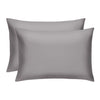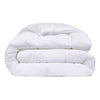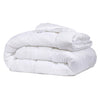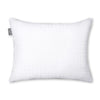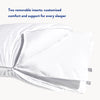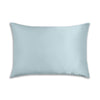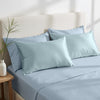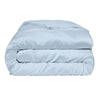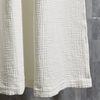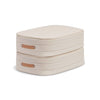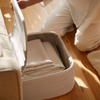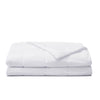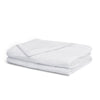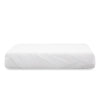The Daily Miracle
What Is Beauty Sleep: Top 5 Benefits
Published
February 20, 2024
Author
Bridget Reed

"Beauty sleep" isn't just a catchy phrase. It’s an ideal that matches up with reality — the better your sleep, and the more often you get the right amount of sleep, the more benefits you’ll experience, both in terms of your appearance and your well-being. And when you feel better and look better, you’ll be more confident, too.
How often have you noticed your skin looking refreshed after a solid night's sleep? Or, on the flip side, found dark circles greeting you after a night of sleep deprivation?
This is because the amount and quality of our sleep have far-reaching impacts on our bodies. Beauty sleep really is just getting proper sleep, and it’s one of the easiest beauty hacks out there. It’s well worth improving your sleep and learning more about why it’s so crucial.
While the right bedroom aesthetics, like soothing paint colors and a comfortable sheet set, play their part, the real magic of beauty sleep lies in its profound effect on our physical and mental well-being.
What are the benefits of getting your beauty sleep? Let’s break it down.
1. A More Radiant Complexion
During sleep, your body increases blood flow to the skin, enhancing skin cells' repair and growth. This is crucial for collagen production, a protein that gives your skin its firmness and elasticity, helping to reduce the appearance of fine lines and wrinkles.
However, sleep deprivation can lead to increased cortisol levels, the stress hormone, which can break down collagen faster than it’s produced. Furthermore, a lack of sleep can cause poor water balance, leading to puffy eyes, under-eye circles, and drier skin that's less capable of fending off irritants and pollutants.
This imbalance can lead to breakouts, increased skin sensitivity, and visible signs of aging. A consistent skincare routine, which includes getting enough sleep, can help maintain skin hydration and prevent these issues.
So, while your retinol night cream may be working overtime, the best way to end up with fewer wrinkles over time or to combat under-eye puffiness is to get better sleep, not to upgrade your moisturizer.
2. Shinier, Healthier Hair
Sleep is a critical time for the body to repair and regenerate hair follicles. Poor sleep can lead to a reduction in the production of melatonin, a hormone that's essential for hair growth. Additionally, a lack of adequate sleep can increase stress, leading to hair loss or thinning.
When we don't get enough sleep, our body's production of human growth hormone is disrupted. This hormone is vital for encouraging hair growth and repair.
Moreover, the scalp's blood flow is enhanced during sleep, providing the necessary nutrients and oxygen to hair follicles, promoting stronger and healthier hair. Maintaining a regular sleep schedule not only aids in the reduction of potential scalp breakouts but also ensures that hair maintains its natural vitality and shine.
3. Boosted Mental Well-Being
Adequate sleep is essential for regulating mood and emotional resilience. When we experience a lack of sleep, our body's production of melatonin is disrupted, leading to imbalances in our mood and cognitive functions. This can result in increased irritability, anxiety, and difficulty in managing stress.
During a good night’s sleep, the brain also processes emotional information, helping us cope with the stresses of everyday life. Quality sleep enhances our brain's ability to make connections and retain information, which is crucial for learning and memory.
Poor sleep, on the other hand, can impair these cognitive processes, leading to decreased focus, memory problems, and difficulty in decision-making. While you may not think of mental well-being as being crucial to outer beauty, it’s true what they say — you’re only as beautiful on the outside as you feel on the inside.
4. Better Focus and Productivity
Sleep's impact on cognitive function is profound. A night of restful sleep can sharpen your attention and enhance your analytical skills, making problem-solving and decision-making much more efficient.
On the flip side, sleep deprivation can severely hamper your cognitive abilities. It's not uncommon to find your thoughts wandering or to struggle with complex tasks after a poor night's sleep.
The relationship between sleep and memory is also significant. During sleep, especially during the deep REM phase, our brains consolidate memories from the day.
This process is essential for learning new information and retaining it. Our ability to learn and remember information is significantly impaired without enough sleep.
Furthermore, sufficient sleep is crucial for creativity. It allows our brain to rest and recharge, often leading to increased creativity and innovation. Beauty sleep isn’t just good for your beauty; in this way, it’s good for helping you create and appreciate beauty around you, too.
5. Improved Longevity and Vitality
Quality sleep is a cornerstone of longevity and vitality. Those who maintain a regular sleep schedule and get the recommended amount of sleep tend to have a lower risk of early mortality compared to those with irregular sleep patterns or chronic sleep deprivation.
Sleep's role in heart health is particularly noteworthy; adequate sleep helps maintain healthy blood pressure levels and reduces the risk of cardiovascular diseases.
Sleep also plays a crucial role in hormonal balance. For instance, sleep regulates leptin and ghrelin, hormones that control appetite and satiety. Disruptions in these can lead to weight gain and associated health problems.
Overall, sleep is a time for the body to repair at the cellular level. This includes the repair of DNA damage that occurs due to various factors like UV radiation and pollution.
Regular, restful sleep supports the body's natural repair mechanisms, contributing to healthier aging and reducing the risk of age-related diseases.
How Do You Get This Elusive Beauty Sleep?
Cracking the code on perfecting your beauty sleep can be complicated — but it doesn’t have to be. Ultimately, it comes down to your sleeping situation.
Is your bed comfortable, or do you need to find something firmer or softer to alleviate aches and pains? Are your pillows supportive enough, or do they throw your spine out of whack while you sleep?
And, most importantly — to us, anyway — is your bedding. If you want to ensure you wake up bright-eyed and bushy-tailed every morning, upgrade your sheets to our Miracle Made® Sheet Set.
They offer the ideal blend of luxury and innovation, integrating natural silver to combat bacteria growth by up to 99.7%. This feature not only keeps your sheets fresher for longer but also cuts down on washing frequency.
The other big thing that can interfere with the quality of your sleep is your sleeping temperature. If you’re too warm or too cold, it can keep you up at night, wake up at night, or otherwise interfere with your beauty sleep. So swap out your old duvet for our Miracle Made® Comforter, designed to help you maintain the ideal temperature all night long.
The Miracle Comforter is designed to redefine your sleep, emphasizing cleanliness and temperature regulation. Its ability to regulate temperature keeps you comfortable throughout the night, regardless of the season. Ideal for those prioritizing hygiene without compromising on luxury, this comforter merges functionality with comfort, providing an unmatched sleep experience.
The Bottom Line
The concept of beauty sleep holds more truth than many might think. It's a critical component of our overall health and well-being, intricately connected to every aspect of our physical, mental, and emotional state.
In the modern world, where the hustle and bustle can often lead to sleep being deprioritized, it's important to remember the benefits of a good night's rest. By embracing healthy sleep practices, such as limiting exposure to blue light before bedtime, engaging in relaxing activities, and creating a sleep-conducive environment, we can give our bodies and minds the rest they need to glow on the outside as brightly as we glow on the inside.
Sources:
Does Poor Sleep Quality Affect Skin Ageing? | National Library of Medicine
Topical Melatonin for Treatment of Androgenetic Alopecia | National Library of Medicine


